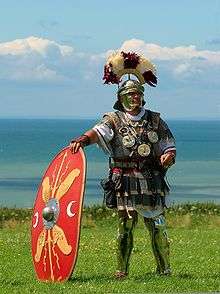Definify.com
Definition 2026
centurio
centurio
Latin

centuriō (a centurion)
Pronunciation
- (Classical) IPA(key): /kenˈtu.ri.oː/, [kɛnˈtʊ.ri.oː]
- (Ecclesiastical) IPA(key): /t͡ʃenˈtu.ri.o/, [t͡ʃenˈtuː.ri̯o]
Etymology 1
From centuria (“division consisting of one hundred”) + -ō.
Verb
centuriō (present infinitive centuriāre, perfect active centuriāvī, supine centuriātum); first conjugation
- I divide into groups of one hundred.
- (military) I arrange into companies.
- (only in perfect participle) having voted according to centuries.
Inflection
Derived terms
- centuriātiō
- centuriātus
Related terms
- centum
- centuria
- centuriālis
- centuriātim
Etymology 2
Alternative forms
- centuriōnus
Noun
centuriō m (genitive centuriōnis); third declension
Inflection
Third declension.
| Case | Singular | Plural |
|---|---|---|
| nominative | centuriō | centuriōnēs |
| genitive | centuriōnis | centuriōnum |
| dative | centuriōnī | centuriōnibus |
| accusative | centuriōnem | centuriōnēs |
| ablative | centuriōne | centuriōnibus |
| vocative | centuriō | centuriōnēs |
Derived terms
- centuriōnātus
Descendants
- English: centurion
- Italian: centurione
- Russian: центурио́н (centurión)
References
- centurio in Charlton T. Lewis and Charles Short (1879) A Latin Dictionary, Oxford: Clarendon Press
- centurio in Charlton T. Lewis (1891) An Elementary Latin Dictionary, New York: Harper & Brothers
- CENTURIO in Charles du Fresne du Cange’s Glossarium Mediæ et Infimæ Latinitatis (augmented edition, 1883–1887)
- Félix Gaffiot (1934), “centurio”, in Dictionnaire Illustré Latin-Français, Paris: Hachette.
- Meissner, Carl; Auden, Henry William (1894) Latin Phrase-Book, London: Macmillan and Co.
- to be elected unanimousl: omnes centurias ferre or omnium suffragiis, cunctis centuriis creari
- to be elected unanimousl: omnes centurias ferre or omnium suffragiis, cunctis centuriis creari
- centurio in Harry Thurston Peck, editor (1898) Harper's Dictionary of Classical Antiquities, New York: Harper & Brothers
- centurio in William Smith et al., editor (1890) A Dictionary of Greek and Roman Antiquities, London: William Wayte. G. E. Marindin